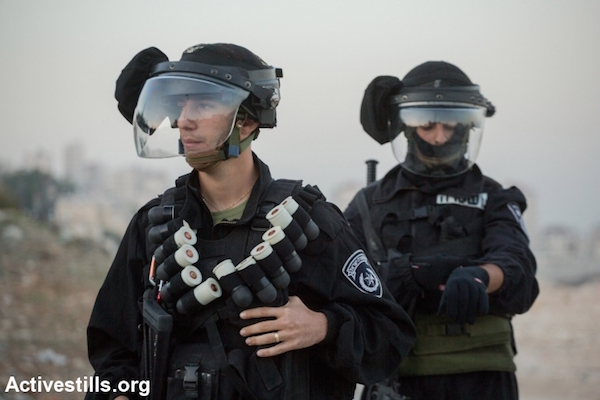A young Palestinian man standing in his own front yard in East Jerusalem gets caught in the middle violent clashes and is shot in the eye with a sponge-tipped bullet. Filing a complaint against the cops set off an unbelievable chain of events.
By John Brown*

A young Palestinian man from East Jerusalem and his attorney filed a complaint against Jerusalem District Police recently detailing accusations of excessive force, false arrest, retribution for filing a complaint, and attempting to rig a polygraph in order to fabricate a false confession.
The chain of events detailed in the complaint began on the evening of October 2, 2015, when “Y,” whose full name we agreed to withhold due to his fear of retribution, was sitting with his family at home in the East Jerusalem neighborhood of Issawiya.
Clashes between neighborhood youths and police were taking place outside on the street, as was relatively common at the time — the start of the current round of violence. Border Police officers were firing tear gas and stun grenades toward the Palestinian youths, so Y and his family closed up all the doors and windows.
One of the rioters threw a Molotov cocktail toward the police, which instead exploded on the exterior wall of Y’s family home. He went outside to try and extinguish the fire.
According to the complaint filed by Attorney Itay Mack on behalf of Y, that is when Border Police officers fired a black sponge-tipped bullet at the face of Y, who was standing in his own front yard.
Manufacturer instructions and police regulations all say that sponge-tipped bullets should not be fired toward the head.
The type of sponge-tip bullets that Israeli police use in East Jerusalem have proven themselves to be particularly dangerous. In the past two years alone they have resulted in more than 30 significantly injureies and killed one teenager. A number of minors in particular have suffered severe injuries to their eyes from the weapons.
Y, too, was shot in the eye and was brought to Shaare Zedek Medical Center. Half an hour later police showed up at the hospital, accused Y of throwing stones, arrested him and handcuffed him to the hospital bed. After five days under arrest, however, a court ordered him released citing the complete lack of evidence against him.
After another two weeks of hospitalization, he was released with severe, probably irreversible damage to his eye.
A month later, on November 5, Y filed a complaint with the Israel Police’s internal affairs division, which is actually part of the Justice Ministry, a complaint against the officers who fired the sponge-tipped bullet at his eye.
That, it turned out, was only the beginning. After filing the internal affairs complaint, police suddenly re-opened the investigation for stone throwing. Y was summoned for two polygraph tests.
According to Y, in the second polygraph, after the test was complete, the examiner asked him to answer “yes” to a series of questions in order “to check if the machine is working.”
The first question was: “did you throw stones?”
It goes without saying that sounds a bit fishy. First of all, calibration tests are generally asked at the start of a polygraph test, and they are usually very simply questions to which the examiner already knows the answers to with absolute certainty. Otherwise it would be impossible to use them for purposes of calibration.
Clearly this had nothing to do with calibration but with what appears to be an attempt to trick Y into providing a false confession. The entire interaction is detailed in Y’s affidavit, in which he says he refused to answer the examiner’s troubling question. The examiner, Y says, got annoyed and told him to “go home. And if we need to we’ll call you in here another 1,000 times.”
Accusations of stone throwing are often made without any evidence, and are often based on confessions or incriminations from other Palestinians. Because there was nobody to incriminate Y, and due to the fact that there was no evidence, it appears police attempted to force a creative confession. What makes things worse, is that it appears all that was meant to cover up police violence.
A spokesperson for the Jerusalem District of the Israel Police provided the following response: “The interrogation was carried out professionally and according to the law. Police will continue to act decisively and professionally in order to provide security for all of the capital’s residents and visitors, and against lawbreakers and those endangering the public security and order.”
*John Brown is the pseudonym of an Israeli academic and a blogger. This article was first published in Hebrew on Local Call, where he is a blogger. Read it here.
